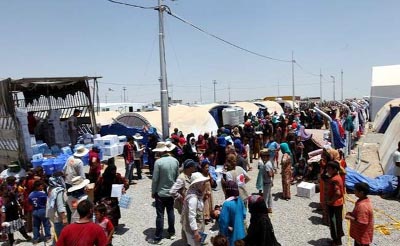
Reuters, Baghdad :
Upcoming military offensives in Iraq against Islamic State, including an assault on the northern city of Mosul, could displace at least 2.3 million people, the United Nations humanitarian coordinator for Iraq said on Thursday.
The prediction of such a vast humanitarian emergency creates additional complications for the Iraqi government and its U.S. allies, who have announced plans for offensives to drive Islamic State fighters this year from most of their Iraqi territory.
More than 3.4 million people across Iraq have already been forced by conflict to leave their homes, according to the United Nations. In the past month, 85,000 people fled Falluja, an Islamic State stronghold an hour’s drive from Baghdad, amid a military campaign that has recaptured large parts of the city.
Most of the displaced are from Iraq’s minority Sunni community, raising concerns among officials that U.S.-backed military gains against Islamic State will not bring stability to Iraq more than 13 years after a U.S.-led invasion toppled Saddam Hussein, a Sunni.
Islamic State fighters swept through much of northern and western Iraq two years ago and declared a caliphate to rule over territory there and in neighbouring Syria.
The jihadists have lost ground in recent weeks to a number of enemies on several fronts in both countries, with the main battles still looming for the caliphate’s two de facto capitals, Mosul in Iraq and Raqqa in Syria.
Lise Grande, the U.N. humanitarian coordinator for Iraq, told Reuters in an interview that at least 430,000 more people could be displaced this year in Anbar, Iraq’s sprawling desert province stretching west from Falluja to the Syrian border.
Government forces have retaken several cities in Anbar from Islamic State in the past six months and are still pressing up the Euphrates river valley towards the border town of Qaim.
Grande said another 830,000 people would be displaced along “the Mosul corridor”, stretching more than 100 km (60 miles) from northern Salahuddin province towards the Islamic State stronghold. In Mosul itself, by far the largest city under the militants’ control, the worst case scenario could see one million people displaced, said Grande. The United Nations projects the Mosul operation will be larger and more complex than any other humanitarian operation in the world this year.
“We’re literally talking in just a few months about doubling the number of families who are displaced in the country,” she said. “We’re trying to pre-position supplies and develop contingencies for all of those areas and we’re doing so with 30 percent of the appeal that we’ve asked for.”
The humanitarian community this year requested $861 million to assist 7.3 million Iraqis in need across the country, but so far it has only received about $266 million.
Iraq’s cash-strapped government, hit by low oil prices and increased military costs, has struggled to help.
Upcoming military offensives in Iraq against Islamic State, including an assault on the northern city of Mosul, could displace at least 2.3 million people, the United Nations humanitarian coordinator for Iraq said on Thursday.
The prediction of such a vast humanitarian emergency creates additional complications for the Iraqi government and its U.S. allies, who have announced plans for offensives to drive Islamic State fighters this year from most of their Iraqi territory.
More than 3.4 million people across Iraq have already been forced by conflict to leave their homes, according to the United Nations. In the past month, 85,000 people fled Falluja, an Islamic State stronghold an hour’s drive from Baghdad, amid a military campaign that has recaptured large parts of the city.
Most of the displaced are from Iraq’s minority Sunni community, raising concerns among officials that U.S.-backed military gains against Islamic State will not bring stability to Iraq more than 13 years after a U.S.-led invasion toppled Saddam Hussein, a Sunni.
Islamic State fighters swept through much of northern and western Iraq two years ago and declared a caliphate to rule over territory there and in neighbouring Syria.
The jihadists have lost ground in recent weeks to a number of enemies on several fronts in both countries, with the main battles still looming for the caliphate’s two de facto capitals, Mosul in Iraq and Raqqa in Syria.
Lise Grande, the U.N. humanitarian coordinator for Iraq, told Reuters in an interview that at least 430,000 more people could be displaced this year in Anbar, Iraq’s sprawling desert province stretching west from Falluja to the Syrian border.
Government forces have retaken several cities in Anbar from Islamic State in the past six months and are still pressing up the Euphrates river valley towards the border town of Qaim.
Grande said another 830,000 people would be displaced along “the Mosul corridor”, stretching more than 100 km (60 miles) from northern Salahuddin province towards the Islamic State stronghold. In Mosul itself, by far the largest city under the militants’ control, the worst case scenario could see one million people displaced, said Grande. The United Nations projects the Mosul operation will be larger and more complex than any other humanitarian operation in the world this year.
“We’re literally talking in just a few months about doubling the number of families who are displaced in the country,” she said. “We’re trying to pre-position supplies and develop contingencies for all of those areas and we’re doing so with 30 percent of the appeal that we’ve asked for.”
The humanitarian community this year requested $861 million to assist 7.3 million Iraqis in need across the country, but so far it has only received about $266 million.
Iraq’s cash-strapped government, hit by low oil prices and increased military costs, has struggled to help.

